The Humanities, Arts, and Culture
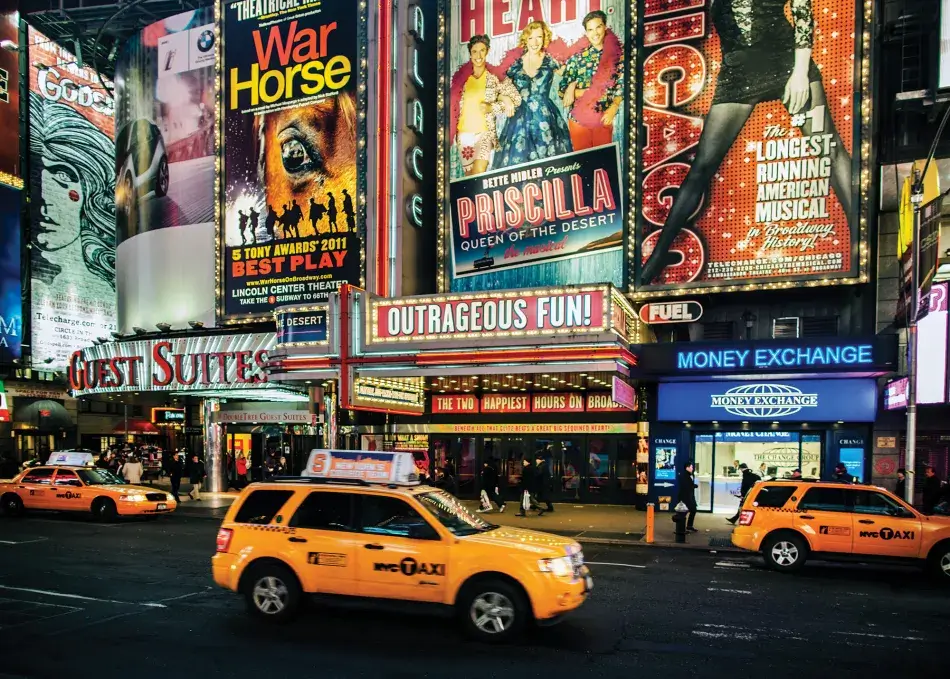
The humanities, arts, and culture are woven through virtually every Academy program, where artists and humanists add interdisciplinary breadth to projects in science, democracy, and security. However, the Academy also undertakes projects that put humanities, arts, and culture at the forefront, strengthening their practice and highlighting their importance to all aspects of the nation’s thriving intellectual life. These projects call attention to the role the arts and humanities play in enriching the growth and vitality of individuals, communities, and the nation.
Project
Commission on the Arts
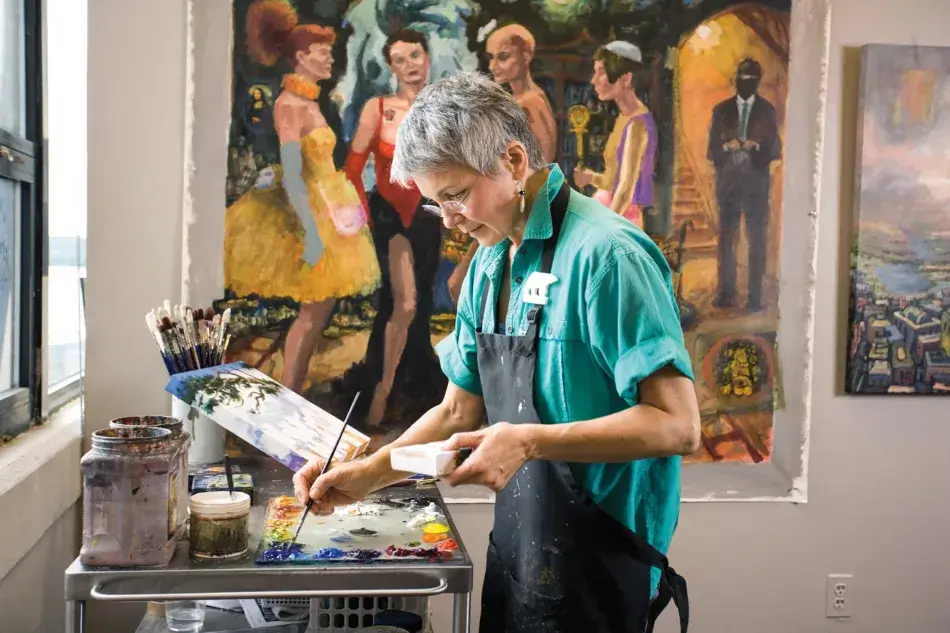
The Commission on the Arts was organized to reframe the national conversation about the role the arts play in a diverse twenty-first-century democracy, with a membership that spanned the cultural field and the geography of the United States. The work of the Commission was given added urgency by the COVID pandemic, which closed venues and institutions, disrupted arts education, and threatened both the lives and livelihoods of creative workers. The artists, scholars, institutional leaders, and community advocates on the Commission issued two reports, making the case for arts education and the need for better federal policies and institutional structures to support a strong and diverse creative economy. The recommendations in the reports have already been used in the development of legislative proposals on Capitol Hill, as well as in local initiatives from Maine to California. A Mixtape of digital contributions from Commission members and other artists as well as a crowdsourced poem, curated by cochair of the Commission and Poet Laureate Natasha Trethewey, “Remix: For My People” (developed with PBS), supplemented the reports.
Commission Chairs
John Lithgow
Actor and Author
Deborah F. Rutter
The John F. Kennedy Center for the Performing Arts
Natasha Trethewey
Northwestern University
COMMISSION MEMBERS
Diane Ackerman
Author, Poet, and Naturalist
Elizabeth Alexander
Mellon Foundation
Maribel Alvarez
The University of Arizona
Rod Bigelow
Crystal Bridges Museum of American Art
Terence Blanchard
Jazz Trumpeter and Composer
Mary Bordeaux
First Peoples Fund
Pam Breaux
National Assembly of State Arts Agencies
Jeffrey Brown
PBS NewsHour
Louise H. Bryson
Public Media Group of Southern California
Francis Collins
National Institutes of Health
James Cuno
The J. Paul Getty Trust
Paul DiMaggio
New York University
Oskar Eustis
The Public Theater
Katherine Farley
Lincoln Center for the Performing Arts
Theaster Gates, Jr.
Rebuild Foundation
Paula Giddings
Smith College
Olivia Gude
School of the Art Institute of Chicago
Nora Halpern
Americans for the Arts
Vicky Holt Takamine
Pua Ali‘i ‘Ilim
Maria Hummer-Tuttle
Hummer-Tuttle Foundation
Gish Jen
Novelist
Brian Kisida
University of Missouri
Angela La Porte
University of Arkansas
Tania León
Composer and Conductor
Sonia Manzano
Actress and Author
Michael O’Bryan
The Village of Arts and Humanities
Felix Padrón
Arts Management Professional and Artist
Annise Parker
LGBTQ Victory Fund
Mwalim (Morgan James Peters)
University of Massachusetts Dartmouth
Victoria Rogers
John S. and James L. Knight Foundation
Jacqueline Stewart
The University of Chicago
Yancey Strickler
Kickstarter
Steven Tepper
Arizona State University
Roberta Uno
Arts in a Changing America
Zannie Voss
Southern Methodist University National Center for Arts Research
Carrie Mae Weems
Photographer
Damian Woetzel
The Juilliard School
Jay Xu
Asian Art Museum of San Francisco
Kevin Young
The National Museum of African American History and Culture, Smithsonian Institution
Laura Zabel
Springboard for the Arts
PROJECT STAFF
Susy Bielak
Consultant
Mary Lyons
Program Coordinator
Allentza Michel
Program Officer
Tania Munz
Chief Program Officer
Jessica Taylor
Louis W. Cabot Humanities Policy Fellow
Robert B. Townsend
Program Director
FUNDERS
The Barr Foundation
Ford Foundation
The Getty Foundation
The John S. and James L. Knight Foundation
The Kresge Foundation
Roger W. and Victoria P. † Sant
† Deceased
Commission Publications
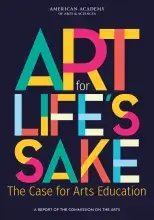
Art for Life’s Sake: The Case for Arts Education (American Academy of Arts and Sciences, 2021)
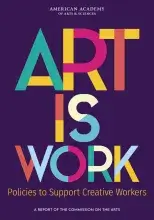
Art Is Work: Policies to Support Creative Workers (American Academy of Arts and Sciences, 2021)
Commission Meetings
Now What? An Action Plan for Advancing Arts Education
September 15, 2021
Distinguished artists and arts education advocates joined a discussion of the Art for Life’s Sake report at the closing plenary session of the 2021 Arts Education Partnership Virtual Gathering. Panelists shared their own personal experiences and ideas for reimagining more equitable arts education opportunities post-pandemic.
New Horizons: Elevating the Arts in American Life
October 27, 2021
In this celebration of arts, artists, and the work of the Commission on the Arts, Stephen Colbert interviewed Cochairs John Lithgow, Deborah Rutter, and Natasha Trethewey. The program included poetry, music, and a discussion of recommendations developed by the Commission to elevate the arts, support artists, and promote arts education in America. The event also introduced Mixtape, an online collection of arts experiences featuring members of the Commission and the Academy.
Congressional Briefing: The Value of Equitable Arts Education
December 9, 2021
In a wide-ranging briefing for members of Congress and their staff, experts on the value of arts education joined the Commission cochairs and two members of Congress to make the case for policies that will ensure access to the arts for every child in the nation’s schools.
Congressional Briefing: Supporting America’s Creative Workers
January 31, 2022
Three members of Congress joined the Commission cochairs and other experts on the importance of artists and the creative economy in a public discussion about ideal federal policies for the field.
Project
The Humanities Indicators

The Humanities Indicators provide nonpartisan statistical information about all aspects of the humanities: from early childhood reading, through undergraduate and graduate education in the humanities, to employment and humanities experiences in daily life, such as reading and visits to museums. Now in its thirteenth year as a publicly available website, the project tracks the condition of the humanities enterprise via analyses of data gathered by the federal government as well as through its own rigorous survey research. The project is one of the most cited activities of the Academy, and journalists, advocates, government agencies, and academics regularly call on the project staff for information and their expertise. Building on the Indicators work, the Summer 2022 issue of Dædalus is dedicated to the humanities and the public, covering topics from the public humanities to the medical and environmental humanities.
Recent work has focused on outcomes for college graduates in the humanities at both the undergraduate and graduate level. The project is developing additional studies, including a survey of high school student attitudes about their encounters with humanities subjects and skills, a report on the state of the humanities in K–12 education, a study about public understanding of the term humanities, an examination of the salaries of humanities faculty relative to other fields, as well as a separate survey of humanities departments about their situation post-COVID. The Humanities Indicators are accessible at www.amacad.org/humanities-indicators.
Project Directors
Norman M. Bradburn
NORC at the University of Chicago
Robert B. Townsend
American Academy of Arts and Sciences
PROJECT STAFF
Carolyn Fuqua
Program Officer
Jessica Taylor
Louis W. Cabot Humanities Policy Fellow
ADVISORY COMMITTEE
Edward Ayers
University of Richmond
Jack Buckley
American Institutes for Research
Jonathan R. Cole
Columbia University
Joy Connolly
American Council of Learned Societies
John Dichtl
American Association for State and Local History
Michael Hout
New York University
Felice J. Levine
American Educational Research Association
Phoebe Stein
Federation of State Humanities Councils
Judith Tanur
Stony Brook University
FUNDERS
Mellon Foundation
Carl H. Pforzheimer III
The Humanities Indicators was developed with generous support from the National Endowment for the Humanities; Elihu Rose and the Madison Charitable Fund; John P. Birkelund; Peck Stackpoole Foundation; Rockefeller Foundation; Sara Lee Foundation; Teagle Foundation; Walter B. Hewlett and the William R. Hewlett Trust; and William and Flora Hewlett Foundation.
Project Publications
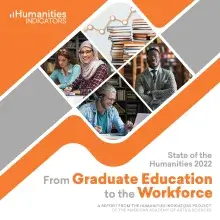
State of the Humanities 2022: From Graduate Education to the Workforce (American Academy of Arts and Sciences, 2022)
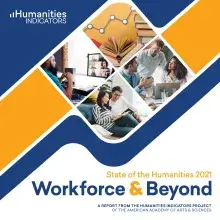
State of the Humanities 2021: Workforce & Beyond (American Academy of Arts and Sciences, 2021)
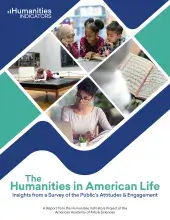
The Humanities in American Life: Insights from a Survey of the Public’s Attitudes & Engagement (American Academy of Arts and Sciences, 2020)
Project Meetings and Presentations
The Public and the Humanities
September–October 2021
The Humanities Indicators hosted a series of online conversations with authors in the Summer 2022 issue of Dædalus on “The Humanities in American Life,” assessing evidence of public engagement with the humanities as well as changes in the field that address emerging public questions and concerns.
National Humanities Conference
November 3, 4, and 12, 2021
Members of the Indicators staff participated in conversations about the state of the humanities.
The Afterlife of the Humanities Major
November 9, 2021
The Academy and the National Humanities Center cohosted an online discussion about what becomes of humanities majors after graduation and how colleges might assist them in their transition into the workforce. The conversation featured the perspectives of both academia and industry and drew on the Indicators report, The State of the Humanities 2021: Workforce & Beyond.
Advisory Committee Meeting
January 20, 2022
At the annual meeting of the Humanities Indicators Advisory Committee, the participants reviewed a draft report on graduate education and assessed plans for future publications and research by project staff.
University of Iowa, School of Humanities
February 17, 2022
Project Codirector Robert Townsend presented on career outcomes and challenges for students who majored in the humanities and discussed emerging trends in the field.
Council of Graduate Schools Quarterly Research and Policy Forum
March 17, 2022
Project Codirector Robert Townsend presented a preview of the Indicators report on the state of graduate education in the humanities to researchers and other specialists in the subject.
University of Georgia, Willson Center for Humanities & Arts
April 12, 2022
Project Codirector Robert Townsend presented a survey of the state of the humanities to students, faculty, and administrators.
American Council of Learned Societies Annual Meeting
April 28–29, 2022
Members of the Indicators staff participated in discussions about the state of the field and distributed copies of recent reports from the project.
University of Arizona, College of Humanities, Humanities Leadership Summit
May 4, 2022
Project Codirector Robert Townsend presented an overview of data about the state of the humanities and participated in discussions about future directions for the field.